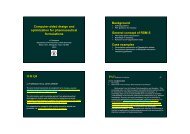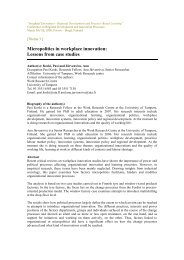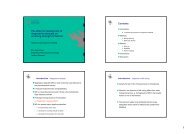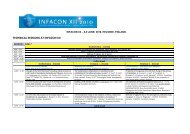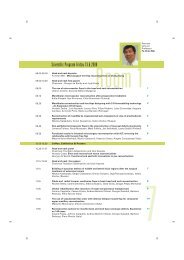Enhancing employees' innovation activity through motivational factors
Enhancing employees' innovation activity through motivational factors
Enhancing employees' innovation activity through motivational factors
Create successful ePaper yourself
Turn your PDF publications into a flip-book with our unique Google optimized e-Paper software.
“Insightful Encounters - Regional Development and Practice–Based Learning”<br />
Conference on Regional Development and Innovation Processes<br />
March 5th-7th, 2008, Porvoo - Borgå, Finland<br />
research process, the company decided to implement a new software tool to ease the customer<br />
knowledge flows and facilitate the sharing between salespeople.<br />
Motivational <strong>factors</strong> to collect and share customer knowledge<br />
The motivation of the participant salespeople to collect and share customer knowledge was<br />
examined in individual interviews and collective meetings (See table 2). Traditionally salespeople<br />
possess a lot of important customer knowledge which can be used as an asset for power. They<br />
have an obligation to report figures to the manager, but qualitative knowledge rising from<br />
intuition is left to minority. Employees can not be told to say their intuitions at loud; only<br />
affecting <strong>through</strong> <strong>motivational</strong> <strong>factors</strong> can that silent knowledge be encouraged to daylight.<br />
Phase of<br />
development<br />
Actions taken<br />
Characteristics<br />
of knowledge<br />
Users’ key<br />
benefits<br />
1.A Start.<br />
What are we<br />
starting?<br />
Informative “lecture”<br />
Individual interviews<br />
Information about the<br />
existing need<br />
Individual motivation<br />
<strong>factors</strong><br />
To get everyone informed<br />
at the same time<br />
Everyone gets to express<br />
opinions<br />
Individual writing<br />
Collective agreement<br />
Collective motivation<br />
<strong>factors</strong><br />
Tacit knowledge<br />
Diminish the de-motivator<br />
“no understanding why<br />
this is important”<br />
2. Justification for<br />
the process<br />
Why should we do<br />
this?<br />
3. Creating<br />
solutions<br />
Generating ideas<br />
around the need<br />
Generating ideas with<br />
creative methods<br />
Creating agreement in a<br />
small group<br />
Collective proposition for a<br />
solution<br />
Organising the ideas<br />
To receive knowledge of<br />
other’s opinions and<br />
starting to create a<br />
collective vision about how<br />
we want to do this<br />
“Many weak signals from<br />
different customers make<br />
a trend”<br />
4. Agreement<br />
Introducing the work of<br />
the small group and<br />
discussion<br />
Introducing the software<br />
and agreeing on the<br />
meetings and their agenda<br />
A promise of the actions to<br />
be taken and the key<br />
persons in the realisation<br />
Choosing a proper<br />
software to ease the share<br />
of knowledge<br />
5. Next steps<br />
Company arranges<br />
meeting in different<br />
factories<br />
Overall knowledge of the<br />
different units of the<br />
company<br />
Successful implementation<br />
will increase motivation to<br />
share customer knowledge<br />
Table 2: The phases of the development process<br />
In the interviews the motivation to bring customer knowledge to the organisation was asked with<br />
questions like (The form of question does vary some according to the person interviewed):<br />
- Do you get ideas from other salespeople? Do you share the weak signals you hear with<br />
others?<br />
- What is the atmosphere to share the customer knowledge? Do you feel like you can say<br />
your wildest ideas at loud?<br />
- What motivates you in your work?



